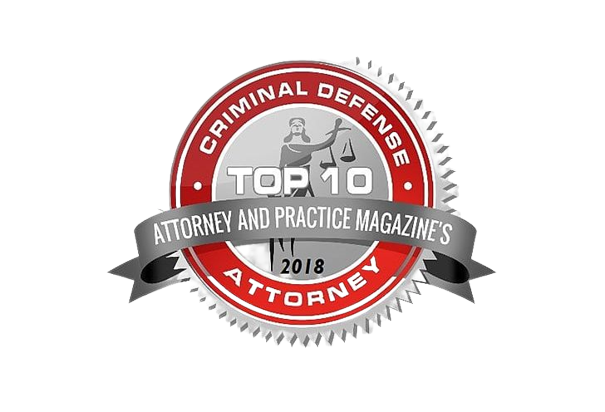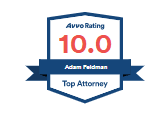Phoenix Theft Lawyer
A Former Prosecutor on Your Side
Home > Theft

2023 Super Lawyers

AV Preeminent Rated

Best Law Firm

A+ BBB Accredited
Have You been Arrested for Theft or Shoplifting?
If you have been charged with theft or a theft-related crime in Phoenix or anywhere in Arizona, you could be facing stiff penalties. Depending upon the circumstances of your particular case, your theft charge may be a felony. Even as a first time offender, a conviction could land you in prison for years. Theft under Arizona law can involve a lot more than simply taking property that does not belong to you. As an experienced theft crimes defense lawyer, Adam Feldman, founder of The Feldman Law Firm, has defended numerous clients charged with a wide variety of theft offenses. And as a former prosecutor, he was responsible for organizing, preparing and trying cases against people charged with theft crimes. This experience has led to proven results in his cases, and provides his clients with the confidence that their attorney has the talent and ability to obtain the best results possible in their criminal cases.
What is Theft in Arizona?
- Controls property of another with the intent to deprive the other person of such property; or
- Converts for an unauthorized term or use services or property of another entrusted to the defendant or placed in the defendant’s possession for a limited, authorized term or use;
Request Your Free Consultation
Theft Lawyer Answers Online Legal Questions
- Obtains services or property of another by means of any material misrepresentation with intent to deprive the other person of such property or services; or
- Comes into control of lost, mislaid or misdelivered property of another under circumstances providing means of inquiry as to the true owner and appropriates such property to the person’s own or another’s use without reasonable efforts to notify the true owner; or
- Controls property of another knowing or having reason to know that the property was stolen; or
- Obtains services known to the defendant to be available only for compensation without paying or an agreement to pay the compensation or diverts another’s services to the person’s own or another’s benefit without authority to do so.”
The statute sets forth six separate categories of offenses categorized as theft. To understand each of the various forms of theft listed above, the following summarizes the essential character of each:
- Basic theft covers any situation where you wrongfully take possession of property that does not belong to you. While the offense may also constitute a specific crime such as shoplifting, burglary or another offense, the essence of the charge is stealing from another person.
- Conversion includes the misappropriation of property which was entrusted to you, but which you then asserted control of, contrary to the terms under which the property was placed in your possession. Here is an example. You are a trustee, either formally or informally, and in that capacity you are entrusted with funds for the benefit of another person or entity. Rather than holding the funds or distributing them under the terms of the trust arrangement, you transfer the money to your own bank account. This is referred to as embezzlement in some jurisdictions, and while there is no separate charge of embezzlement under the Arizona Criminal Code, that crime falls within this subsection of the statute. No matter how the offense is defined, the essence of the charge is that you came into possession of the property lawfully, then illegally “converted” it to your own use.
- When you obtain property or services through a material misrepresentation with intent to deprive another person of that property or those services, you are guilty of theft. A representation is “material” when it is instrumental in allowing you to obtain the property or services. This variation of theft, in its simplest sense, is fraud, and includes any conduct which involves obtaining property or services through a material misrepresentation, made with the intent that another person rely on it.
- The fourth version of theft in Arizona occurs when you exercise control (take for your own use or benefit) property of another which the other person has lost or misplaced, and where you have the means to attempt to identify the rightful owner, but where you fail to use reasonable efforts to do so. An example would be finding a wallet containing cash on the street, taking the cash, yet ignoring the driver’s license or other identifying information in the wallet which would have allowed you to locate the owner. The question of what constitutes “reasonable efforts” is an issue decided on a case to case basis.
- If you exercise control over property which has been stolen, you are also guilty of theft. To “exercise control” does not necessarily mean that you claim the property as your own. All that is required under this section is that you exclude someone from using their property except on your terms. In some states this is known as receiving stolen property.
- Obtaining services without paying for them is referred to as “theft of services.” A common example is the diversion of cable, internet, electrical or other services so that you obtain the use of the service without paying for it. “Services” under the statute are not limited to utilities; the definition also includes professional services, labor, and hotel accommodations, among other things.
In addition to the categories set forth above, there are a number of other offenses specifically enumerated under Arizona law as theft crimes. They are set forth in sections 13-1803 through 13-1819 of the Criminal Code. In each case, there is an aspect of the charge that sets it apart from the general offenses listed in section 13-1802:
- Taking unlawful control of someone else’s means of transportation (class 5 felony), or being a passenger in a vehicle with knowledge that it is unlawfully in the possession of another (class 6 felony), even without the intent to permanently deprive the owner of possession. “Means of transportation” is defined as any vehicle.
- Theft by extortion consists of utilizing a threat, whether of physical harm (class 2 felony), property damage or any other threat (class 4 felony) that would cause a person to part with their property.
- Shoplifting. This includes not only stealing merchandise, but also concealment of goods. The classification of the offense depends upon the value of the property, prior criminal history, gang activity and other factors, including the method used to effectuate the theft.
- Without notice to the lessor and without good cause, failure to return a vehicle (class 5 felony) or other leased property (class 1 misdemeanor) within 72 hours of the time provided in the rental agreement.
- Issuing or passing a bad check, knowing that there are insufficient funds in the account for payment of that check as well as any other outstanding checks, is a crime. Issuing bad checks is a class 1 misdemeanor, unless the amount of the check exceeds $5,000 and the full amount is not paid within 60 days, in which case it is a class 6 felony.
- Theft of a motor vehicle, or any vehicle not propelled by human power, is a class 3 felony. It consists of unlawfully asserting control over another person’s vehicle with intent to permanently deprive the owner of that vehicle; or converting or using a vehicle that has been entrusted to a defendant for a limited term; or fraudulently obtaining a vehicle with intent to permanently deprive the owner of its use; or asserting control over a lost vehicle without making reasonable efforts to notify the owner; or taking control of a stolen vehicle.
- An agent who holds a power of attorney and uses the power to deprive the principal of his property is guilty of theft. The classification of the crime is dependent upon the value of the property wrongfully taken, and unlawful use of a power of attorney may be as low as a class 1 misdemeanor or as high as a class 2 felony.
Note that there are sometimes subtle differences between and among the various theft crimes. The specific charge may depend upon the issue of knowledge or intent, the means by which a theft is committed, or other factors involved in the specific conduct alleged.
There are additional miscellaneous theft offenses, including removal of a theft detection device; misappropriation of funds of a charter school; unlawful possession, use or alteration of sales receipt or UPC label; and organized retail theft, which requires only that the person stealing the merchandise intends to resell it, or the theft is accomplished using a device, container or other article used in the commission of the crime.
Finally, there are numerous theft and theft-related offenses, such as identity theft (including taking the identity of another person or trafficking in the identity of another person), credit card fraud, business and commercial fraud, organized crime fraud, forgery, possession of a forgery device, burglary, possession of burglary tools, criminal simulation, criminal simulation and others that, while they involve theft as most people commonly understand it, are separately classified under the Arizona Criminal Code.
Award Winning Criminal Defense








What Is the Penalty for Theft in Arizona?
- Under $1,000. Class 1 misdemeanor. Sentence – up to six months.
- $1,000 or more, but less than $2,000. Class 6 felony. Sentence – up to 1.5 years.
- $2,000 or more, but less than $3,000. Class 5 felony. Sentence – .up to 2 years.
- $3,000 or more, but less than $4,000. Class 4 felony. Sentence – up to 3 years.
- $4,000 or more, but less than $25,000. Class 3 felony. Sentence – up to 7 years.
- $25,000 or more. Class 2 felony. Sentence – up to 10 years.
Why Choose Adam Feldman as Your Lawyer?
Navigating the various theft statutes is not easy. The number of specific offenses is substantial, as are the penalties. Offenses often overlap one another, and prosecutorial discretion in formulating charges can affect both the crime and the penalty.
It is essential that you retain the services of an experienced Phoenix criminal defense lawyer who can protect your interests and cut through these complicated and often confusing criminal statutes. At The Feldman Law Firm, we specialize in representing clients charged with theft offenses and other violations of the criminal law. And as a former prosecutor, Mr. Feldman understands the way prosecutors build their cases and how they determine which charge or charges to file in situations where the conduct may constitute different crimes. He knows how to negotiate with the government to seek to have charges dismissed or reduced, and if it is necessary to take a case to trial, his experience in conducting innumerable jury trials is invaluable.
If you are facing a theft or theft-related charge, call The Feldman Law Firm to schedule a free consultation.
Criminal Law Firm Near You
Schedule a Consultation



